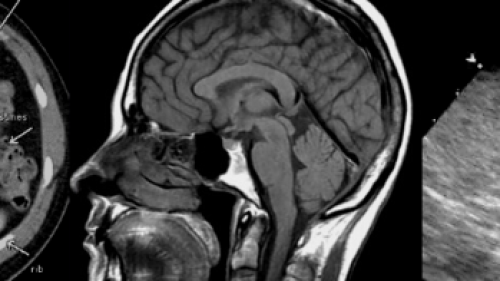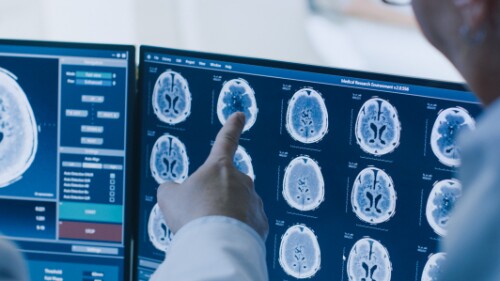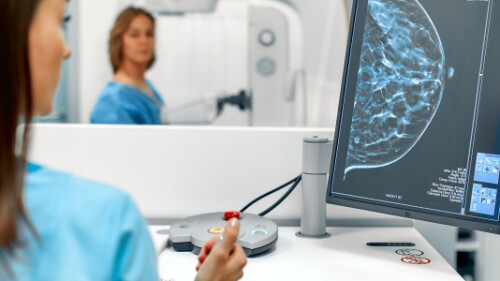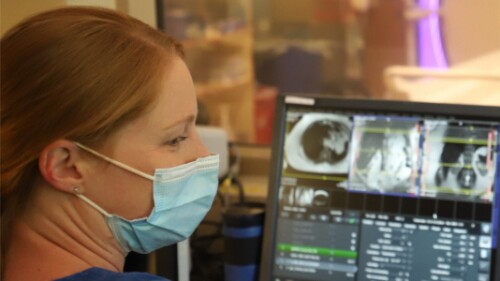
Magnetic Resonance Imaging
The online Magnetic Resonance Imaging (MRI) Certificate at Kent State University provides specialized training for healthcare professionals interested in advancing their skills in MRI technology. This program covers MRI principles, safety, and scanning techniques, preparing graduates to work effectively in MRI imaging environments. Ideal for radiologic technologists looking to expand their qualifications, this certificate enhances both career opportunities and expertise in the medical imaging field.
Magnetic Resonance Imaging Undergraduate Certificate Program Overview
The Magnetic Resonance Imaging undergraduate certificate program provides coursework in anatomy, patient management, procedures and image production. Students observe magnetic resonance imaging procedures, perform procedures under direct supervision by registered technologists and complete required clinical competencies toward the national certification exam for magnetic resonance imaging or to be applied toward continuing education requirements as deemed by the American Registry of Radiologic Technologists (ARRT).
Magnetic resonance imaging (MRI) scans are ordered on orthopedic, neurological, cardiovascular, cancer and non-trauma patients and is extremely beneficial for examining soft tissue structures. An MRI technologist works in hospitals or outpatient healthcare facilities using an MRI scanner that uses a magnetic field and computer-generated radio waves to create detailed images of the organs and tissues in the body. The images are assembled and reconstructed digitally to create a series of diagnostic images that physicians use to interpret for a patient diagnosis.
The Magnetic Resonance Imaging certificate offers a seamless transfer pathway into the Bachelor of Radiologic Imaging Sciences Technology degree. Students are able to complete the certificate, sit for the national certification exam, begin working in the profession and then enroll in the B.R.I.T. degree and complete the remaining requirements to earn the bachelor’s degree.
Program Learning Outcomes
Graduates of this program will be able to:
- Apply knowledge to the practice of magnetic resonance imaging.
- Effectively utilize critical thinking, problem-solving and decision-making skills in the practice of magnetic resonance imaging.
- Effectively communicate in oral and written form with patients, customers and all members of the health care team.
- Successfully perform magnetic resonance imaging procedures and attain results of high diagnostic value while providing patient care.
- Exhibit personal and professional attributes and values relevant to the practice of magnetic resonance imaging.
Professional Licensure Disclosure
This program is designed to prepare students to sit for applicable licensure or certification in Ohio. If you plan to pursue licensure or certification in a state other than Ohio, please review state educational requirements for licensure or certification and contact information for state licensing boards at Kent State’s website for professional licensure disclosure.
Magnetic Resonance Imaging Undergraduate Certificate Program Admissions Requirements
Admission to this program is selective. Applicants must have graduated from a program in radiologic technology, diagnostic medical sonography, nuclear medicine or radiation therapy and be a registered or registry-eligible radiologic technologist, diagnostic medical sonographer, nuclear medicine technologist or a radiation therapist. Applicants must have a minimum 2.50 overall GPA prior to program entry.
The program begins in fall with an application deadline of July 1 each year.
Program Courses
Program Requirements
| Code | Title | Credit Hours |
|---|---|---|
| Certificate Requirements 1 | ||
| RIS 34084 | COMPUTED TOMOGRAPHY AND MAGNETIC RESONANCE IMAGING SECTIONAL ANATOMY I (min C grade) | 2 |
| RIS 34086 | COMPUTED TOMOGRAPHY AND MAGNETIC RESONANCE IMAGING SECTIONAL ANATOMY II (min C grade) | 2 |
| RIS 44031 | PATIENT MANAGEMENT IN MAGNETIC RESONANCE IMAGING (min C grade) | 2 |
| RIS 44044 | MAGNETIC RESONANCE IMAGING PROCEDURES I (min C grade) | 2 |
| RIS 44045 | MAGNETIC RESONANCE IMAGING PROCEDURES II (min C grade) | 2 |
| RIS 44051 | MAGNETIC RESONANCE EQUIPMENT AND IMAGE ACQUISITION I (min C grade) | 2 |
| RIS 44052 | MAGNETIC RESONANCE EQUIPMENT AND IMAGE ACQUISITION II (min C grade) | 2 |
| Clinical Electives, choose from the following: | 4 | |
| RIS 44003 | MAGNETIC RESONANCE IMAGING CLINICAL EDUCATION I | |
| RIS 44063 | MAGNETIC RESONANCE IMAGING CLINICAL EDUCATION II | |
| RIS 44092 | COMPUTED TOMOGRAPHY/MAGNETIC RESONANCE INTERNSHIP (ELR) | |
| Minimum Total Credit Hours: | 18 | |
1Students are encouraged to register for the following courses during summer term: RIS 44066 is a review course for the national certification exam. RIS 44073 allows students to gain added experience in MRI and to complete required clinical competencies for the ARRT exam. The courses are not required to graduate with the certificate.
Magnetic Resonance Imaging Undergraduate Certificate Program Tuition and Fees
Ohio Residents
| Per Credit Hour | Per 2-Credit Course | Approximate Tuition Cost |
$405.15 Upper Division Courses | $1,215.45 | $7,200 part-time1 $4,400 full-time 2 |
Non-Ohio Residents
| Per Credit Hour | Per 2-Credit Course | Approximate Tuition Cost |
$415.15 Upper Division Courses | $1,245.45 | $7,400 part-time3 $4,600 full-time4 |
1The $405.15 per-credit-hour tuition rate for UPPER division courses applies to part-time Ohio resident undergraduate students taking fewer than 12 credit hours per semester. This certificate consists of all upper division courses.
2The flat-rate semester fee of $4,457.36 for UPPER division courses applies to full-time Ohio resident undergraduate students taking between 12-18 credit hours per semester, This certificate consists of all upper division courses.
3The $405.15 per-credit-hour tuition rate for UPPER division courses applies to part-time non-Ohio resident undergraduate students enrolled in a fully online degree program and taking fewer than 12 credit hours per semester, PLUS a $10 per-credit-hour surcharge. This certificate consists of all upper division courses.
4The flat-rate semester fee of $4,457.36 for UPPER division courses applies to full-time non-Ohio resident undergraduate students enrolled in a fully online degree program and taking between 12-18 credit hours per semester, PLUS a $10 per-credit-hour surcharge for actual credits taken (between 12-18 semester credits or $120-$180). This certificate consists of all upper division courses. The amount is based on student completing the program in 1 semester.
- An additional Distance Learning fee for all students enrolled in a distance learning course is $15 per credit hour. Program tuition and costs are estimated and subject to change.
- Actual tuition costs will vary based on a student’s chosen academic plan. The full cost of attendance consists of tuition and fees, and when applicable, food, housing, books, course materials, supplies and equipment, transportation and personal expenses for the enrolled terms. Other expenses not included in tuition and fees totals can be found on the Kent State University cost of attendance web page.
- For a complete listing of tuition rates for approved online programs, please contact Kent State’s Financial, Billing & Enrollment Center at 330-672-6000 or via our website Contact Us link.
Magnetic Resonance Imaging Undergraduate Certificate Careers
- 7.0% faster than the average
- 38,700 number of jobs
- $74,690 potential earnings
Notice: Career Information Source
* Source of occupation titles and labor data comes from the U.S. Bureau of Labor Statistics’ Occupational Outlook Handbook. Data comprises projected percent change in employment over the next 10 years; nation-wide employment numbers; and the yearly median wage at which half of the workers in the occupation earned more than that amount and half earned less.







